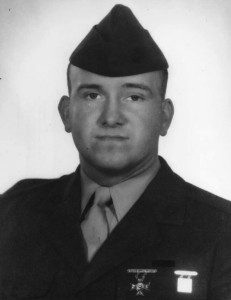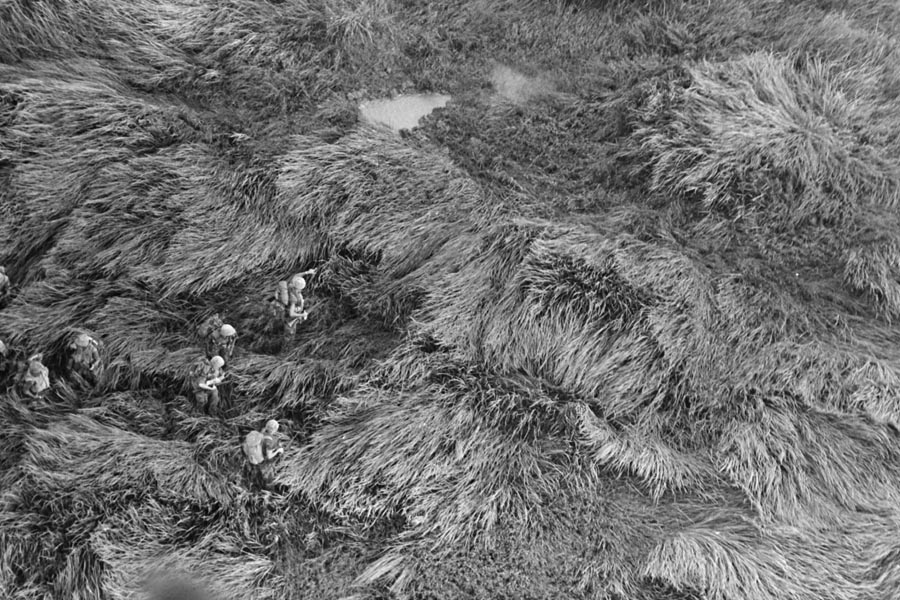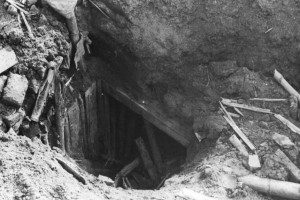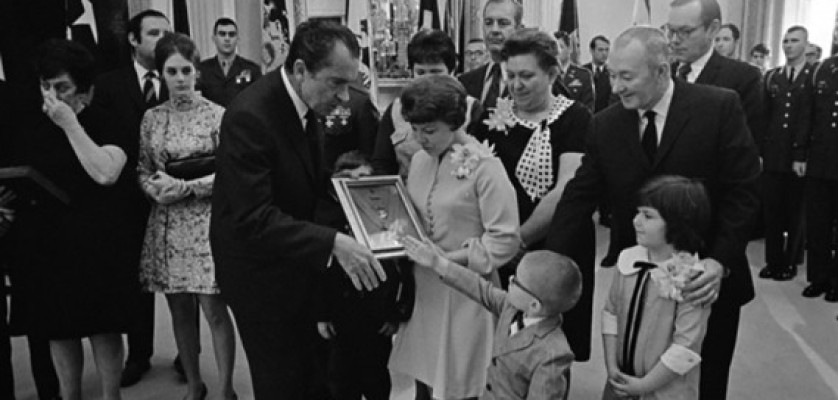When Marine Corps Staff Sgt. Karl Gorman Taylor Sr. was called upon to rescue a trapped platoon in Vietnam, he didn’t hesitate to do whatever it took to get his comrades to safety. For Taylor, that meant giving his life for theirs — a sacrifice that earned him a posthumous Medal of Honor.
Taylor was born July 14, 1939, to parents Arthur and Anna Taylor. He and his younger brother, Walter, grew up on a small farm outside of Laurel, Md.

Taylor went to Arundel Senior High School but left after his junior year in 1956 to work in construction. In January 1959, both he and his brother joined the Marine Corps.
After infantry combat training, the elder Taylor served with the Fleet Marine Force at Camp Lejeune, N.C. In the early days of his career, he was able to study for his high school equivalency diploma and, in 1961, earned that from the former Armed Forces Institute in Madison, Wisc.
Taylor served as a drill instructor for a time before going on inactive duty with the Marine Corps Reserve. However, about three months later, in late March 1963, he returned to active duty to serve at Marine Corps Base Quantico, Va.
At some point during those years, he married Shirley Ann Piatt. They went on to have two boys, Karl Jr. and Kevin, as well as a daughter, Sheryl.
In August 1964, Taylor deployed to Vietnam with the 3rd Marine Regiment, 3rd Marine Division. A year later, he was reassigned as an instructor for the Non-Commissioned Officer Leadership School for Fleet Marine Force, Pacific.
He returned to Quantico in January 1966 for duty as a platoon sergeant at Officer Candidate School before being promoted to staff sergeant on Sept. 1, 1966.
In February 1968, Taylor returned to Vietnam for his second tour of duty, again with the 3rd Marine Division. He was assigned as a platoon sergeant and company gunnery sergeant of Company I of the 3rd Battalion, 26th Marine Regiment.
In December 1968, Taylor’s unit was part of Operation Meade River, which was a combined search and destroy mission to regain control of various areas in Quang Nam Province — specifically, to push the enemy out of an area called Dodge City. That region was known to be a staging area and command post for the North Vietnamese Army and Viet Cong troops moving toward U.S. bases at Da Nang, which was about 10 miles south.

On the night of Dec. 8, 1968, Taylor was acting as the company gunnery sergeant when his unit got pinned down by heavy enemy fire. At some point, he learned that the commander of the lead platoon had been killed, so he and another Marine quickly staged a rescue effort to help the remaining members of the beleaguered platoon.
Both men crawled through a hail of hostile fire to reach the unit, where they shouted instructions and encouragement to the men and deployed them to covered positions. Several times, Taylor and the other Marine maneuvered across an open area to rescue seriously wounded platoon members who couldn’t move themselves.
When Taylor learned that other seriously injured Marines were trapped in another open area near an enemy machine gun, he and four others moved across the fire-swept terrain to try to rescue them. Soon after, though, their progress was stopped by intense enemy fire, so Taylor ordered the others to go back to the company command post.

From there, Taylor grabbed a grenade launcher and, in full view of the enemy, charged across an open rice paddy toward the machine gun’s position, unleashing devastating fire as he went. He was wounded several times but succeeded in getting to the enemy bunker and taking out its machine gun and gunners. Moments later, he was killed. However, his efforts saved the lives of several of his fellow Marines.
Taylor’s brother, Walter, later told reporters that he was informed of his brother’s death while he was a drill instructor in San Diego. He said Taylor was supposed to return from deployment a mere 20 days later.
Taylor is buried in Independence Cemetery in Independence, Penn., where his wife and children were living at the time of his death.
In honor of his sacrifice, Taylor was awarded the Medal of Honor. His wife and children were presented the medal by President Richard M. Nixon during a White House ceremony on Feb. 16, 1971. His youngest son, 4-year-old Kevin, even made the news for saluting Nixon after the presentation.
Eleven other men — three Marines and eight soldiers — also received the Medal of Honor that day.
To honor his father, Kevin Taylor went on to become a career Marine as well. When he was promoted to gunnery sergeant — a rank his father was set to be advanced to before he died — he dedicated the promotion to his father, according to a May 2005 Pittsburgh Post-Gazette article. The younger Taylor retired from service that same year.
Editor’s note: Medal of Honor Monday highlights Medal of Honor recipients who have earned the U.S. military’s highest medal for valor.










